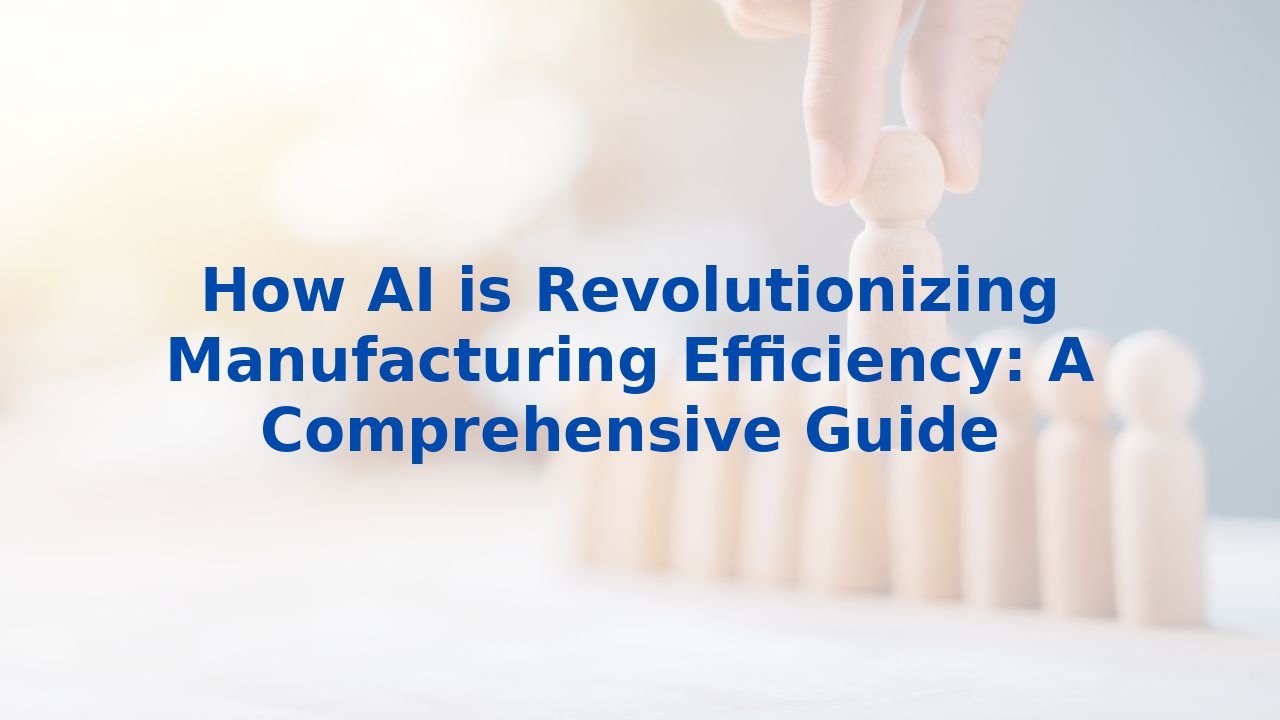How AI is Revolutionizing Manufacturing Efficiency: A Comprehensive Guide
How AI is Revolutionizing Manufacturing Efficiency: A Comprehensive Guide
The manufacturing landscape is undergoing a profound transformation. Challenges like escalating regulatory demands and looming cybersecurity threats are reshaping the industry. In fact, a staggering 58% of professionals in the sector have pinpointed cybersecurity as a primary concern—surpassing skills shortages and change management issues. Fortunately, advancements in artificial intelligence (AI) are injecting new life into manufacturing processes, enhancing efficiency, and addressing these challenges head-on.
The Role of AI in Manufacturing
Artificial intelligence is not merely a buzzword—it's a game-changer that's revolutionizing how manufacturers operate. From automating monotonous tasks to optimizing complex decision-making processes, AI is improving overall efficiency. Let’s explore a few key areas where AI is making a notable difference:
Predictive Maintenance
Imagine a world where equipment failures are anticipated and mitigated before they occur. AI-powered predictive maintenance leverages machine learning algorithms to analyze sensor data, predicting when a machine is likely to fail. This proactive approach minimizes downtime and boosts productivity. No more unexpected halts in production; it’s all about foreseeing challenges and tackling them before they become costly setbacks.
Quality Control
In a sector where quality is paramount, AI-driven quality control systems are invaluable. These systems inspect products in real time, detecting defects with precision that humans simply can’t replicate. By ensuring higher quality standards, manufacturers can elevate customer satisfaction, reduce waste, and foster a more reliable brand image—all of which contribute to enhanced competitiveness in the market.
Supply Chain Optimization
In an era where customer expectations are rising rapidly, supply chain optimization is crucial. AI analyzes supply chain data to create more efficient models for inventory management, reducing lead times and improving logistics performance. By dynamically adjusting to fluctuations in demand, manufacturers can operate leaner and more efficiently, ultimately increasing their bottom line.
Cybersecurity
Consider the magnitude of threats posed by cybercrime in today's digital landscape. AI-powered systems excel in detecting and responding to these threats with an agility that outpaces traditional methods. By safeguarding sensitive data and preemptively addressing vulnerabilities, manufacturers can protect not just their operations but also their reputations.
Benefits of AI for Improving Efficiency
So, what’s the ultimate takeaway? The integration of AI into manufacturing processes provides a plethora of advantages that enhance operational efficiency while addressing sector-specific challenges:
- Enhanced Decision-Making: AI offers real-time data analysis, allowing manufacturers to make informed decisions swiftly.
- Automation: The automation of repetitive tasks liberates human resources to concentrate on strategic and inventive projects.
- Improved Accuracy: AI minimizes the risk of human error, ensuring higher accuracy in production and quality control practices.
- Scalability: AI systems are flexible, capable of managing vast data volumes and scaling alongside organizational growth.
The Importance of Employee Training
As powerful as AI technologies can be, their effectiveness is only as strong as the people who wield them. This brings us to the significance of employee training. Here’s why skilling up your workforce is imperative:
- Understanding AI Capabilities: To successfully integrate AI into their day-to-day operations, employees must comprehend both the capabilities and limitations of the technology.
- Effective Use of Tools: Training employees ensures that they can maximize the benefits of AI tools, elevating overall productivity.
- Adoption and Adaptation: As the technology landscape evolves, fostering a culture of innovation through training prepares organizations to adapt and thrive.
- Ethical Considerations: Understanding the ethical implications of AI usage is crucial for responsible and sustainable AI deployment.
Conclusion
As the manufacturing sector stands at the crossroads of tradition and innovation, embracing AI is not merely optional; it's essential. By leveraging AI for predictive maintenance, quality control, supply chain optimization, and cybersecurity, manufacturers enhance productivity, reduce costs, and amplify their competitive advantage. Moreover, investing in comprehensive employee training programs ensures that the full benefits of these technologies are harnessed, paving the way for a resilient and adaptable organization.
The future of manufacturing is here; it’s time to embrace it. Are you ready to transform your organization? Explore Complete AI Training to learn about empowering your entire workforce with the skills necessary to thrive in this new era.



